September 19, 2024 | 16:52 GMT +7
September 19, 2024 | 16:52 GMT +7
Hotline: 0913.378.918
September 19, 2024 | 16:52 GMT +7
Hotline: 0913.378.918
According to Dong Nai Province's Department of Planning and Investment, the province implemented 16 investment projects in agriculture between 2021 and 2023, with a total investment capital of over 1.3 trillion VND. These include 12 domestic projects with a total registered capital of nearly 962.3 billion VND and 4 foreign direct investment (FDI) projects with a total registered capital of nearly 14 million USD. Notably, the Long Thanh High-Tech Industrial Park in Long Thanh District will house a radiation processing plant and a Research Center for Radiation Technology Development, with an annual irradiation capacity of 100,000 tons and a total investment capital of 650 billion VND.
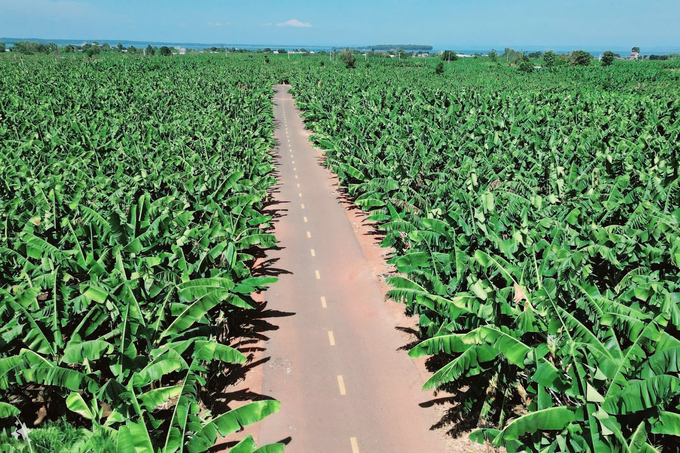
Dong Nai Province has established specialized production areas for crops and livestock, providing significant advantages for attracting investors to the local agricultural sector. Photo: Minh Sang.
Dong Nai Province is currently home to approximately 2,000 businesses and agricultural supply production facilities, which is an increase of 335 compared to 2021. These businesses specialize primarily in producing fertilizers, animal feed, aquaculture feed, and seeds for crops and livestock. With considerable advantages in raw material and specialized production areas, the province is focusing on attracting investment in high technology and clean agriculture with a focus on building sustainable value chains from production to processing and distribution.
In practice, major businesses, farm owners, and small-scale farmers who transitioned from traditional farming practices to high-tech applications have made investments in high-tech agriculture, resulting in significant economic benefits. Additionally, the adoption of high technology across various agricultural sectors has helped reduce production costs, increase productivity, lower prices, and improve product quality while protecting the environment. Consequently, the province is expanding various local agricultural models and forming cooperative groups and high-tech agricultural cooperatives based on sustainable value chain linkages.
Xuan Tien Agricultural Trade and Service Cooperative in Xuan Loc District plays a key role in connecting farmers to build large-scale fields for corn and specialty, high-value rice cultivation. The cooperative also supplies agricultural materials to its members and local farmers in addition to promoting mechanization in production and processing. "Farmers in the cooperative have actively adopted high technology to improve productivity and quality. As a result, our specialty rice product, cultivated with clean practices, fetches higher prices compared to the general market, thereby ensuring a stable output and income source for the cooperative members," remarked Tran Quang, Director of the Cooperative.
The most commonly adopted high-tech models include automatic and semi-automatic irrigation systems; Good Agricultural Practices (GAP); greenhouse and net house production; substrate-based cultivation; semi-automatic livestock production in combination with cold barn technology; and super-intensive shrimp production.
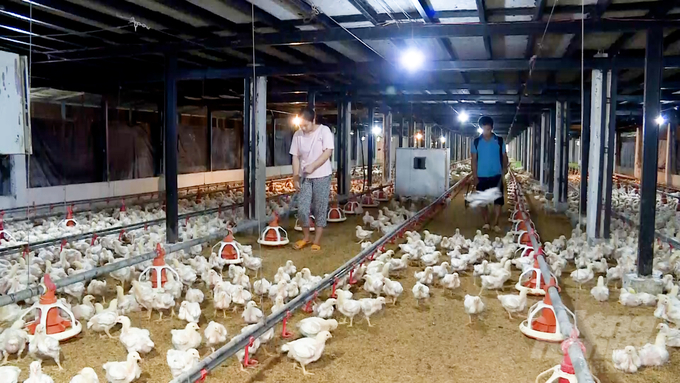
Dong Nai Province has proactively set its course for developing livestock production with a focus on modern industrial practices. Photo: Minh Sang.
As the country's livestock hub, Dong Nai has quickly adopted a modern and industrial approach to livestock production. Pigs and chickens are the province's primary livestock, with farm-scale operations accounting for approximately 90% of the total production capacity. The application of automated machinery plays a significant role in the livestock sector, including tasks such as cleaning and disinfecting barns, operating semi-automatic feeding systems, providing automatic watering, cooling barns, incubating eggs, and managing storage and transportation.
The province is home to 442 high-tech livestock farms, which account for nearly 21% of the total number of local farms. All of these farms utilize cold or enclosed barns. Several farms have also invested in new, advanced technologies from around the world.
Le Van Quyet, Director of Long Thanh Phat High-Tech Agriculture Cooperative in Long Thanh District, stated that the cooperative has pioneered the adoption of high technology to develop a chicken production chain that meets export requirements for the Japanese market. The chain encompasses various partners, including suppliers of breeding stock, feed, processing, export services, and farm owners. With the integrated chicken production chain, the cooperative secured favorable pricing and stable income for local farmers.
In addition to advantages in geography, infrastructure, and large-scale specialized production areas, Dong Nai Province is committed to supporting agricultural and rural development, inspiring confidence in its investors. Additionally, the local government focuses on attracting businesses to invest in clean agriculture and high-tech adoption through various initiatives.
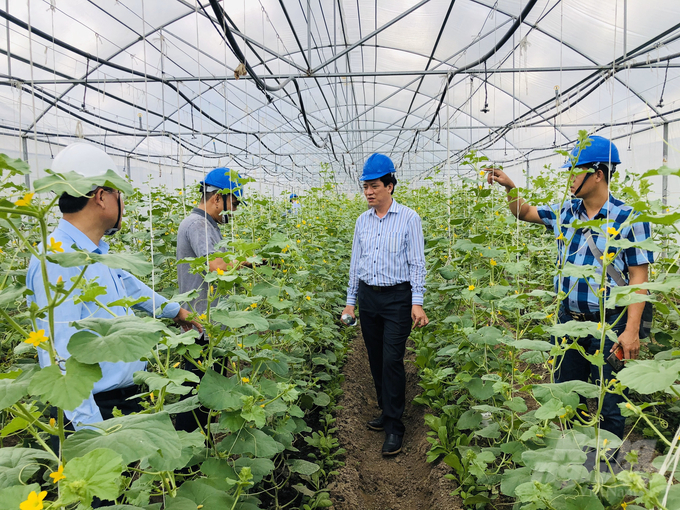
Businesses investing in greenhouse melon farms in Dong Nai Province. Photo: Minh Sang.
Each year, Dong Nai Province develops investment promotion programs and project portfolios to attract investors, with a special emphasis on projects that employ advanced, new, high-tech, and clean technologies. The province also prioritizes attracting investment in agriculture and agricultural processing technology. Furthermore, local stakeholders actively organize dialogue forums with businesses, connect businesses with producers, and facilitate the linkage between producers and commissary kitchens. They also guide and support businesses in selecting investment sites and assist businesses and cooperatives in building supply chains and participating in trade activities both within and outside the province.
According to Tran Vu Hoai Ha, Deputy Director of Dong Nai Province’s Department of Planning and Investment, attracting investment from businesses is crucial for the development of rural areas. Accordingly, it generates jobs and income for workers, increases export revenues, and contributes to building new rural communities. This activity is also a key strategy for restructuring the agricultural sector towards enhancing added value and promoting sustainable development.
Regarding policies to encourage investment in agriculture, the province is currently developing two industrial clusters: Long Giao Industrial Cluster in Cam My district and Phu Tuc Industrial Cluster in Dinh Quan district. These clusters prioritize attracting businesses that engage in deep and refined agricultural processing to form value chains, increase added value, improve production efficiency, address output challenges for agricultural products, raise incomes for local residents, and promote green agriculture.
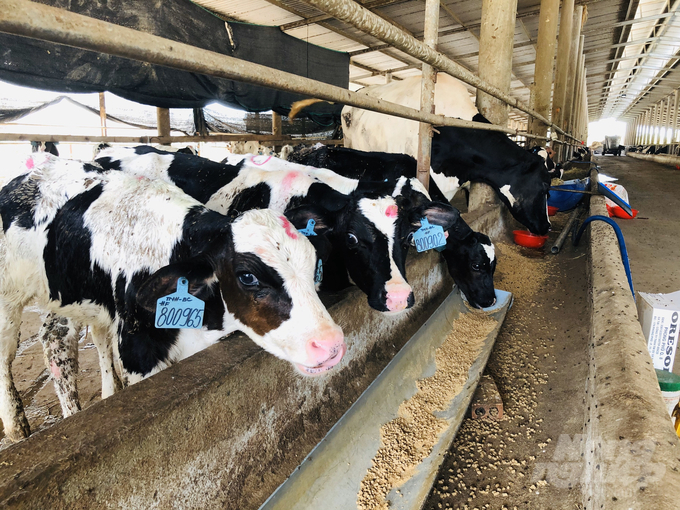
Businesses and livestock farms in Dong Nai province are pioneers in adopting high technology. Photo: Minh Sang.
In an interview with Vietnam Agriculture News, Tran Lam Sinh, Deputy Director of Dong Nai Province's Department of Agriculture and Rural Development, noted that Dong Nai, and the Southeast region as a whole, plays a crucial role in attracting investment in livestock product processing for both domestic consumption and export. Notably, several major corporations and businesses in the region have invested in establishing large-scale processing plants that meet the export requirements for demanding markets. The region is also a priority for businesses looking to invest in developing livestock production areas that provide raw materials for processing and export activities.
According to Deputy Director Sinh, the local government aims to support and create a favorable environment for business development. Every year, the province organizes dialogue events with the local business community to promptly address existing challenges. The Department of Agriculture and Rural Development acknowledges the concerns raised by businesses and aims to further assist in overcoming obstacles in the near future.
"High-tech agriculture is one of the breakthrough goals for Dong Nai Province, as it offers multiple advantages in attracting investment from businesses and farmers. Local governments must enable local businesses and farmers to invest in expanding high-tech agricultural models that are suitable for the conditions of each area," emphasized Vo Van Phi, Deputy Chairman of the Dong Nai Provincial People's Committee.
Translated by Nguyen Hai Long
/2024/09/18/1210-0-164636_321.jpg)
(VAN) The mulberry growing and silkworm raising profession is opening up new opportunities to get rich for people in Huong Son district with an abundant fund of garden land, hill land, and fertile riverside land.
/2024/09/18/2125-0-140019_742.jpg)
(VAN) Van Hoa Investment Joint Stock Company organized a workshop to introduce the Golden VN77 passion fruit variety and build an export linkage chain.
/2024/09/17/2216-1-145324_80.jpg)
(VAN) The distributed water storage solution recommended by the Southern Institute of Water Resources Research has helped specialty fruit gardens in the Mekong Delta overcome drought and salinity.
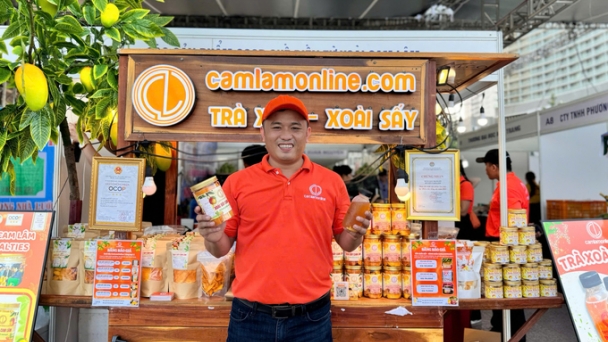
(VAN) A group of three 90s members from Cam Lam District in Khanh Hoa started their business with local mangoes, focusing on processing to enhance its value.
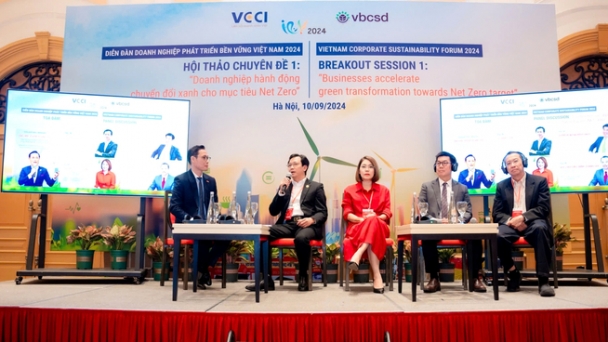
(VAN) C.P. Vietnam recently participated in a discussion at the Vietnam Cooperate Sustainability Forum 2024, aiming for green transformation and Net Zero goal.
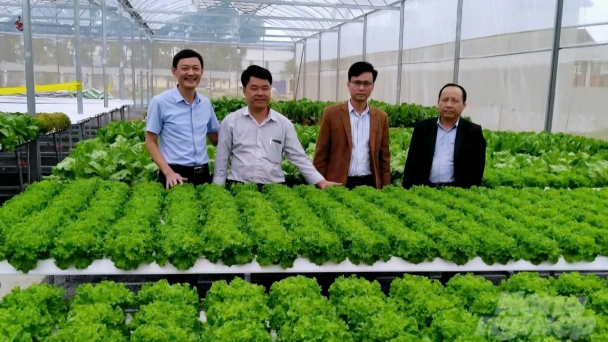
(VAN) Clean agriculture means no worries about price competition and consumption markets. This direction is in line with Thanh Hoa farmers’ farming trend.